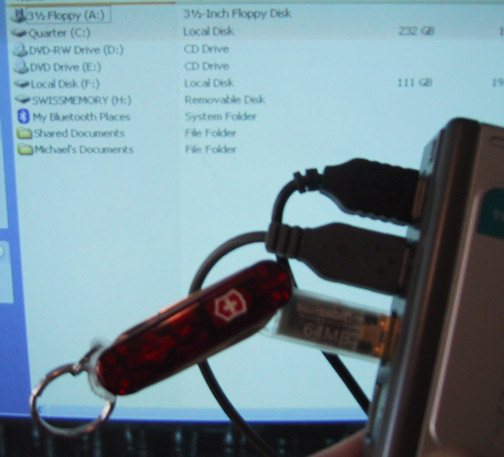This is the one thousandth post on my weblog.
I started an ‘official’ weblog on January 21st, 2000. I had been posting info on the net for several years before that, but that was the moment I began using software to update my site. At the time, I was using software called Newspro that was all the rage.
I started the site because I was inspired by a site called Lum the Mad. Lum wrote about online gaming and was hilarious sarcastic in doing it. He closed down the site after a while, but he had inspired me to begin writing. Scott (Lum’s real name) still runs a weblog at Broken Toys.
The first real content I posted on the net besides baby pictures is called The most expensive cup of coffee back in August of 1997. Even after almost seven years, it’s still a funny story.
So there you have it, after almost four and a half years of pure weblogging and seven year of posting on the internet, I’ve hit a thousand entries.
While a few of my entries have been of the ‘sorry I haven’t posted’ genre, for the most part, I’ve tried to make it interesting for people besides my mother, who likes everything I say or right (except fucking profanity, she hates the profanity).
I wonder what the next thousand will be like.
Here are a few entries you might enjoy:
When I liked Netscape instead of IE
A what I ate for dinner post
A lunch observation
That time I almost died in the hospital
Competitive Twinkie Eating
The death of Pom-Pom
Seven toothbrushes, four people
Photoblogging
Gameboy Advance Video
As my daughters get older and more tech saavy, I am challenged to keep them entertained. On our last trip, I brought not one, but TWO laptops to keep the DVDs rolling on the flights. Still, we ran out of batteries.
I thought about other options and stumbled onto the GBA Movie Player. It allows you to convert video down to low bitrates, put it on an compact flash card, and play the video on your Gameboy Advance. That sounds cool, but the conversion on media seems like asking for some headaches.
Last weekend I stumbled upon Majesco Gameboy Advance Video. It looks like the conversion headache is solved. The cartridges have episodes on them and are ready to roll.

I picked up a cartridge this week and gave it a try. At $20 a pop it’s comparable to a DVD, but without the expensive player.
The playback couldn’t be simpler. Zoe & Mira had no trouble understanding what I was showing them and promptly ran off with it. To the kids, the quality is good and it’s a dream come true. The only trouble is that the screen is just too small for two children to watch it at the same time.
I had a little free time today and made up a little video to show how it works.
Demo of Gameboy Advance Video (1.8 MB WMV file)
Demo of Gameboy Advance Video (4.6 MB MPEG file, for the WMV impaired)
You’re seeing the future here folks. Just imagine in a few more years when this kind of portable video and players will be widely available.
Thirty Seven

Today is my thirty seventh birthday.
37 is one of those special prime number birthdays, I’m taking the day off to have fun instead of going into work. I don’t get another prime number birthday until four years from now, so I better enjoy this one.
To my friends and family, I thank you. It’s been a wonderful 37 years.
I do wish my body was 17 again though. I don’t like that my body makes funny creaking and popping sounds now.
Quote of the day
I read this on Anil Dash’s site today.
“There’s a part of me that’s always felt that, if you’re a professional at a certain trade, and I can come in as an amateur and do better than you, then you probably suck.”
Preach on brother…
Chainsaw
The tree in our front yard died a while ago. I kept putting off cutting it own.
Until today that is:

The tree before I unleashed the chainsaw.

The stump after my work with the chainsaw.
The next step is getting a professional to pull out that stump. Cutting down the branches and cleaning up the mess was a pain in the butt. I’ll be happy to pay to get that stump out.
I know I’ll be having Advil for breakfast tomorrow.
It’s in the genes
As long time Cruft readers may remember, my Father has a bit of a fascination with Swiss Army knives with a collection of hundreds.
Recently he has been longing for the new Swiss Army Knife with USB and 64MB of flash memory. It arrived and he showed it to me yesterday.

Here you can see the knife plugged into my hub. Notice the drive SWISSMEMORY on the screen. It actually works.
Here is proof positive that my geekiness is inherited from my father.
Steve Burns brings the rock
Last night Michele and I went to see Steve Burns play. With cups of 7-Eleven coffee we waited in line outside for the doors to open and the opening acts.

Once inside, I went to the bar to get a couple drinks. I look to the right and sure enough, there was Steve sitting at the bar drinking a Bud talking to some hot blonde woman. He had cut his hair very short and was wearing glasses. I kept thinking he looked very much like Cory Doctorow.
There were a couple of opening acts that were OK, but we spent some of their acts killing time. Michele had brought a book and was reading. I was chatting in IRC over my uber-phone.

Around 11:30PM, Steve hit the stage started getting the show set up. There was a large screen behind him, several video cameras, and a ton of electronics.
There couldn’t have been more than 40 people in the bar and as he got started, he told the crowd to move closer. He pointed to the floor in front of him and said, “This is where the Rock happens. Come closer to the Rock.” Very Jack Blackish…

And with that, Steve began to rock. The video screen started rolling. In fact, video was running throughout the show. The screen showed different things. Sometimes it was video from the various cameras in the room. Sometimes it was specific video that went along with the song and sometimes it was just a funny snippet that played during a break in the music.
I had listened to his music before and I enjoyed the show. Like many times in the past, I find most shows overdo the feedback and drown the vocals in the guitars. I sang along with several of the songs and had a good time.
The only drawback was that Steve was concerned that the video was working right, so he kept checking the screen and the various monitors. Kinda distracting. A few parts of the video show were neat. At one point the projector pointed at his body and you could see the video play in his chest. In the final song, Mighty Little Man, the video of his friend Gabe dancing was great.
Here you can see a short snippet of Steve playing that I recorded on my phone, for no other reason than I can record video on my phone. Steve plays Mighty Little Man. (You’ll need the Divx coded to see it. It’s only 9 seconds long so don’t fret if you can’t watch it.)
Steve’s next album will be interesting and it will be fun to see how he grows as a performer. He’s got a lot to learn, but he does have more talent than lots of the other bands playing these days.
Pride
I am proud of my daughter Zoe.
For the last several months, she’s been saving up money. Between visits from the tooth fairy, grandmothers, and doing various chores she had built up quite a stash.
Yesterday morning she announced she wanted to go to the video game store to buy something for her Gameboy Advance.

Here she is counting out the singles to buy Kirby Nightmare in Dream Land.
She got the used copy and saved $5.
I’m not sure what makes me prouder, her savings or her desire for video games…
Damn…
So I do a little post-lunch surfing and stumble into Tony Pierce’s Links Page.
Damn…
That makes my links page look so weak-ass it’s not even funny.
I need to get off my lazy ass and get my design groove on.
On another LA note, Jonah at LAblogs.com has definitely got his groove on. His recent posts in which he digests the best of LA bloggers multiple times a day for perusal is fantastic. I need to buy that man a beer.
Letters, we get letters…
This morning I received an email from a reader of this site. I get letters regularly that are one line comments, but this one showed some real effort. I thought you all might find it funny.
This email was about my page on How to Wash a Baseball Cap. You might want to read that first before reading the email.
Ms. Laurel writes:
Michael,
I’m writing in response to your feature about washing baseball caps.
I was one of the many people who stumbled upon your site after having searched in google for “washing” and “hats”. I heard that its totally common to wash baseball caps in dishwashers so I needed to find out how to go about this and whether I needed to take out all the dishes first.
I am in a tennis class and I wear my friend Cynthia’s visor everyday which she doesn’t know. I decided it was the tax for leaving it in my car and also not returning a couple messages I left. Point is, I’m not a hat person PER SE but I find myself wanting to wash a hat. If it’s someone elses hat I have to be sure and not abuse the hat. Right now it’s in the washing machine like you instructed. If anything happens to it, I’m going to forward Cynthia’s complaints to you at this email address.
Just kidding. What I actually wanted to say is: yes, I’m female, but you really should not be telling people it’s okay not to wash their hats. Poppycock! Okay I see what you’re doing and uh, I’m glad you’re empowering men to be their inner slob or have some “cleanliness relativity” philosophy or something, but have you ever heard of BLACKHEADS? They are a very real thing. You should consider yourself lucky to get them instead of huge pulsing zits in their place, too.
If one doesn’t wash ones hat… EVER.. one will eventually have a forehead full of proof of their . That’s what I heard.
Have you seen how GRAYISH BLACK those white bands along the front visor can get? Have you SMELLED some stinky hats?
I’m sure that as a guy you’re really used to never smelling another guys items of clothing, but I’ve had the unfortunate experience of harmlessly picking up a guy’s hat and putting it on my head only to instantly feel like sweat and dirt and odour was seeping through my skin faster than acid. I could’ve asked first, and I learned my lesson, but still. Not only that, but you’re really generalizing men negatively, I think, by discrediting the likeliness that the average man would consider doing such a thing as washing his baseball cap.
The reason I bothered searching for info on washing hats in dishwashers is because all sorts of guys participated in a very intense conversation about their personal hat-washing methods. (I didn’t pay much attention; it was awhile ago.)
So you should be giving these ideas to people on the internet who might maybe think you’re a role model because you have a website and feel inclined to start dressing like you. I’m shocked at the poor journalism you exhibited on this page. You actually threaten women that their man will wash our silk garments IN THE WASHING MACHINE.. WITH BLEACH! Such unveiled malice! As a woman – I feel threatened!
I haven’t gotten a chance to check out the rest of your site because I’m washing clothes right now, but if this page is any indication of how the rest will play, I’m going get the email address to someone at Morality in the Media ready for me to paste into the address bar at the touch of Conrol + V. Or maybe someone at Tide™. Maybe we can get you some free samples or an feature in an ad spot. Or at the very least educate you about the benefits of Febreeze.
continued…
laundry is done. I have to give you props on one thing: the hat looks okay after an ordinary, fanci-free round in the washer… so I’ll leave Tide™ out of this here conflict of interests between yourself and yours,
Truly
And now, my response:
Laurel,
So good to hear from you and glad to find that my brief note on hair washing was useful. I endeavor to serve the public. I also promise not to tell your friend Cynthia that you have absconded with her hat, though I do agree it serves her right for leaving it in your car.
In regards to your concerns that dirty hats cause blackheads, I am the one that calls ‘Poppycock’. Two things. First, grown men don’t really care much blackheads and other things that involve peering into a mirror for hours on end to find. Second, the cause of blackheads is lack of good facial cleanser and lack of proper exfoliation.
I remain steadfast in my belief that a man has the option to not wash his hat. Show what I wrote to any man and he will agree with what I wrote. Guaranteed. While it may infuriate a women to suggest that cleaniness is not always best, it is true. It’s OK to be dirty sometimes.
Please let me know if you have a weblog so that I might learn more of the thinking of today’s young women. I have two young daughters and need to prepare myself.
Once again, thank you for your letter!
P.S. My wife likes your letter.
